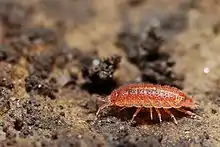Androniscus dentiger
Androniscus dentiger, the rosy woodlouse or pink woodlouse is a species of woodlouse found from the British Isles to North Africa.[3]
| Androniscus dentiger | |
|---|---|
 | |
| Scientific classification | |
| Kingdom: | |
| Phylum: | |
| Subphylum: | |
| Class: | |
| Order: | |
| Family: | |
| Genus: | Androniscus |
| Species: | A. dentiger |
| Binomial name | |
| Androniscus dentiger | |
| Synonyms [2] | |
| |
Description
A. dentiger is a small woodlouse, at only 6 mm (¼ in) long, and is characteristically pink or orange in colour, with a yellow stripe along the midline of the dorsal surface,[4] which divides in two towards the animal's tail. It has large eyes for its size and a granular exoskeleton.[5]
Ecology
In the British Isles, A. dentiger is found in a wide variety of habitats, including coastal areas, gardens, old quarries[4] and caves.[6] It lives where there is a significant amount of lime available, and is reported to show a preference for Anglican churchyards over Catholic ones because the older, Protestant churches used ox-blood mortar.[7]
In the south of its range, A. dentiger is primarily troglobitic, with populations in different cave systems being genetically isolated by the lack of migration between caves.[8] Animals like A. dentiger which prefer to live in caves, but are not restricted to the cave environment may be termed troglophilic.[9]
In North America, A. dentiger is only known to occur in greenhouses.[2]
Subspecies
According to some authors, A. dentiger may be considered a complex of sibling species or cryptic species .[3] Six subspecies are recognised:[1]
- Androniscus dentiger africanus Arcangeli, 1939
- Androniscus dentiger caecus Brian, 1938
- Androniscus dentiger calcivagus Verhoeff, 1908
- Androniscus dentiger croaticus Strouhal, 1939
- Androniscus dentiger dentiger Verhoeff, 1908
- Androniscus dentiger ligulifer Verhoeff, 1908
References
- "Androniscus dentiger Verhoeff, 1908". Integrated Taxonomic Information System. Retrieved November 7, 2010.
- Helmut Schmalfuss (2003). "World catalog of terrestrial isopods (Isopoda: Oniscidea) — revised and updated version" (PDF). Stuttgarter Beiträge zur Naturkunde, Serie A. 654: 341 pp. Archived from the original (PDF) on 2009-02-24. Retrieved 2009-02-19.
- Gabriele Gentile; Giuliana Allegrucci (1997). "Geographic variation and genetic relationships in populations of the Androniscus dentiger complex from Central Italy (Isopoda, Oniscidea, Trichoniscidae)". International Journal of Speleology. 26 (1–2): 47–61. doi:10.5038/1827-806x.26.1.5.
- "Woodlouse wizard — less common species". Natural History Museum. Retrieved February 19, 2009.
- Angelo Gross. "Androniscus dentiger — le cloporte rosâtre" (in French).
- "Life in the cave — Crustacea". Cambrian Caving Council. Retrieved November 7, 2010.
- Joe Kennedy (July 5, 2008). "Meeting Dublin's wildest residents: review of Wild Dublin by Eanna ni Lamhna". Irish Independent.
- Ivan H. Tuf; Karel Tajovský; Jan Mikula; Vratislav Laška; Roman Mlejnek. "Terrestrial isopods (Isopoda: Oniscidea) in and near the Zbrašov Aragonit Caves (Czech Republic)" (PDF). Proceedings of the International Symposium of Terrestrial Isopod Biology – ISTIB-07. I. Biodiversity & Systematics: 33–36. Archived from the original (PDF) on 2011-07-18. Retrieved 2009-02-19.
- Lee Knight (2007). "Cave Life in Britain" (PDF). Freshwater Biological Association. Archived from the original (PDF) on 2011-07-17.